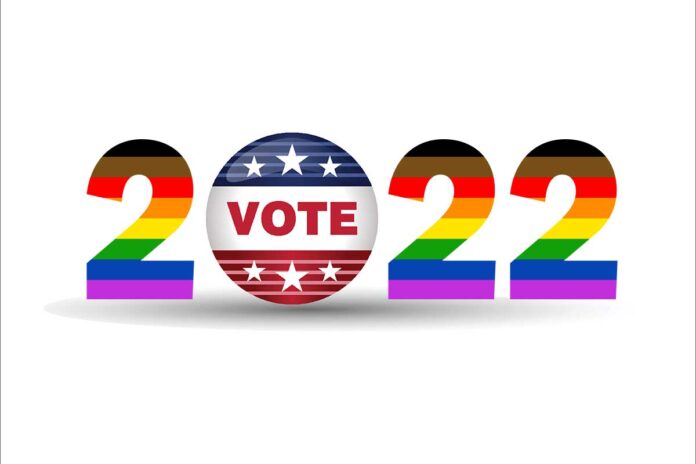If there was one singular lesson to be learned from 2022 for LGBT+ people it was this: making our voices heard has never been more necessary to survival. This was true in the U.S. and throughout the world where LGBT+ remain under extreme threat solely for their sexual orientation and gender identity.
Whether it was fighting for vaccines for mpox or fighting for representation in elected office or fighting to maintain civil rights it took decades to secure, LGBT+ people in the U.S. found themselves taking to the streets and to the polls to make sure their voices were heard.
Yet some of the biggest LGBT+ stories of the year — stories with far-reaching implications — continued to be told almost solely in the queer press. It took months for Brittney Griner’s wrongful detention to become a mainstream headline. Throughout her wrongful detention, PGN was one of the only news outlets reporting regularly on her status as the world’s best-known political prisoner.
Thousands took to the streets in Iran over the death in custody of Mahsa Amini on September 16, 2022. Yet despite calls to treat women differently in the months-long protests, at no point have the names of Zahra Sedighi-Hamedani, 31, known as Sareh, and Elham Choubdar, 24, been mentioned. The two lesbian activists were sentenced to death by an Iranian court on charges of “corruption on earth through the promotion of homosexuality.”
Iran’s state news agency, Islamic Republic News Agency (IRNA) reported the sentencing of the women on September 5. The fate of a third activist, Soheila Ashrafi, 52, has yet to be decided. Calls for the release of the women from groups like Amnesty International as well as the U.N. have gone unheeded.
Throughout the United States the rise of right-wing extremism has impacted LGBT+ people. The claim that queer and trans people are “grooming” youth to be queer and trans became a focal point of legislation from the GOP. Florida Gov. Ron DeSantis led the rhetoric with his “Don’t Say Gay” law, while Texas Gov. Greg Abbott took time from sending migrants to Philadelphia, New York and D.C. to threaten parents of trans youth who sought gender-affirming care.
In Europe, right-wing extremism threatened LGBT+ people and curtailed human rights. In the U.K. a shocking series of shifts in leadership led to three prime ministers in a matter of months — all with anti-LGBT+ politics and policies. Amidst the turmoil in Britain, Italy elected its first woman leader, Giorgia Meloni, a far-right and virulently anti-LGBT+ neo-fascist.
Eastern Europe continued to move further right, with Poland and Hungary emulating Russia with anti-LGBT+ rhetoric and policies. And in Russia, an anti-LGBT+ propaganda law was strengthened.
In the U.S. white nationalist groups continued to infiltrate the Republican party and spread white nationalist, anti-Semitic and anti-LGBT+ rhetoric. The impact of that rhetoric was felt in increased discrimination, harassment and violence against LGBT+ people. The massacre at Club Q killed five people and injured 25 others, some critically. When the suspect, Anderson Lee Aldrich, 22, was apprehended, his father seemed more relieved to discover his son was a mass murderer rather than gay.
Just weeks later an attack on substations in North Carolina was linked to a drag show in Moore County, North Carolina, some 90 miles outside Charlotte. That action revealed that in 2022, attacks on drag shows by far-right groups like the Proud Boys, who were also involved in the January 6 insurrection, had escalated to well over 100.
All of which led to questions about how to control the violence. New reports indicated that far-right protests targeting the LGBT+ community showed a clear and disturbing link with violent attacks. Far-right activists engaged in at least 55 public actions targeting members of the LGBT+ community, according to a new report released this week by the Armed Conflict Location & Event Data Project (ACLED).
But that data doesn’t include the protests against drag shows nationally, which GLAAD reported faced at least 141 protests and significant threats in 2022.
It remained conventional wisdom that the GOP are the enemy of LGBT+ people, with leaders like DeSantis and Abbott reaffirming that along with House Minority Leader Kevin McCarthy and some of the worst extremists in the House including Georgia’s Rep. Marjorie Taylor Greene. And the midterm rhetoric was wholly focused on ratcheting up anti-LGBT+ sentiment, as was evidenced in Pennsylvania and Georgia.
What flew under the radar in 2022 was how often Democrats, particularly in the Biden Cabinet, had failed LGBT+ people and missed significant opportunities to stand for this beleaguered and threatened minority which has been a consistent voting bloc for Democrats.
Why did it take Secretary of State Antony Blinken over two months to declare Brittney Griner’s detention wrongful? Why didn’t HHS Secretary Xavier Beccera intervene in the mpox outbreak? And where was Secretary of Education Miguel Cardona when queer and trans students were being targeted and attacked by school districts nationwide?
What happened to LGBT+ people in the U.S. and globally demands our attention and our concern. The lesson is succinct: The time for activism is not in the past — it is now. The attacks on the LGBT+ community are not going away. The only way to protect the most vulnerable members of this most vulnerable community is to fight back. Advocacy groups like GLAAD, HRC, MAP, ACLU and others are behind us. But the fight must also come at every level from the community itself. That is the commitment that should be on everyone’s list of resolutions for 2023.
